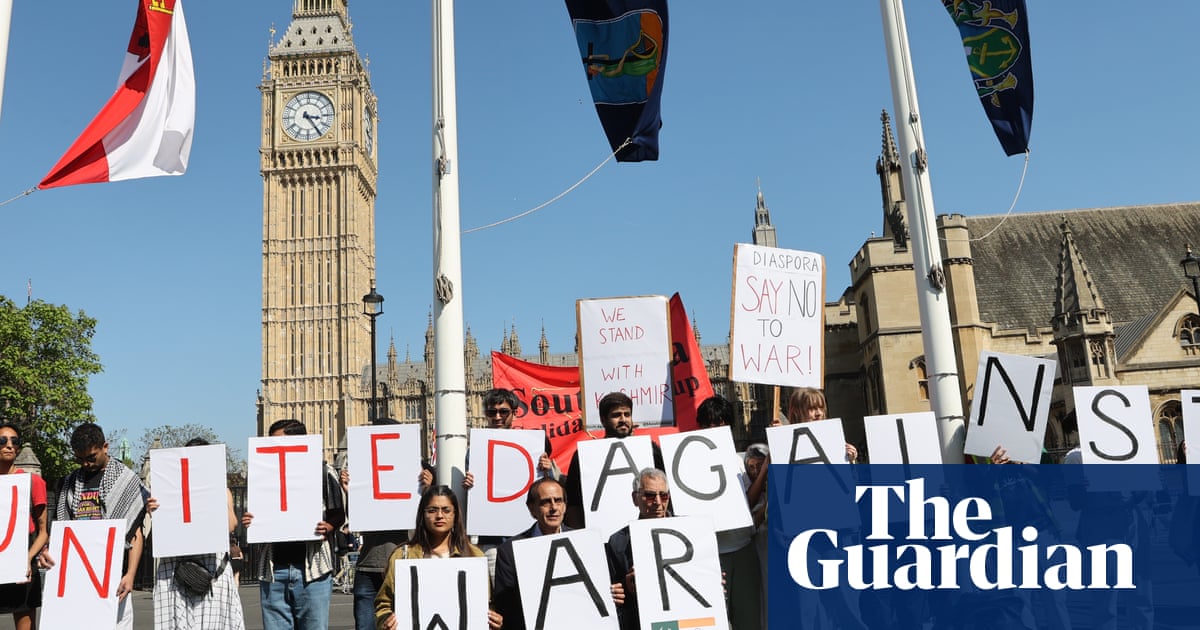People around the world held their breath this week as India and Pakistan appeared to edge closer and closer towards war.
For diaspora communities with family in the region, especially in Kashmir and along the border between the two countries, recent days in particular have been filled with fear and anxiety.
On Saturday, a US-mediated ceasefire offered some reprieve, though the news was undercut by cross-border shelling and explosions in Indian-administered Kashmir hours after it was announced.
While the longevity of the ceasefire remains in doubt, the initial news provided some relief for members of the UK’s south Asian community, who had gathered in Parliament Square in central London to call for de-escalation.
“We cried a little, it was absolute joy,” said Raman, 26. “I come from India and I’m pretty close to the border. It was a constant worry about what was going to happen.”
“I’ve haven’t sleep for three nights. We are constantly checking our phones. Today is the longest I’ve stayed without checking my phone in four days.”
Nasreen Rehman, 74, was similarly relieved by the announcement. “Thank goodness, we’ve averted something which could have been catastrophic but already a lot of lives have been lost.”
After 26 people were killed in an attack at a popular local tourist destination in Kashmir, India paused the vital Indus waters treaty which governs the distribution and use of waters from the Indus River between the two countries.
Rehman is concerned about the suspension of this longstanding agreement. “At the end of the day, we are human beings. We share a history and we share the future. Now we have threats of stopping water? What does that mean?”
While a ceasefire pulls both nations back from the brink of all-out war, there are still concerns about how robust it will be.
“How many times in the past year have we heard the word ceasefire? We’ve heard that far too many times in the context of Israel-Palestine and it has meant nothing,” said Rajiv Sinah, 27.
“Our demonstration, which was called a few days ago, is no less relevant today despite the news of a supposed ceasefire because now we need to advocate for a way forward.
“The people of India, the people of Pakistan and the people of Kashmir want nothing more than peace and to be able to live their own lives and instead they are losing their lives, their livelihoods, their families at the behest of governments that do not represent their people,” Sinah added.
Tarun Gidwani, 36, is similarly apprehensive. “It was a huge relief but even though there’s a ceasefire, there isn’t the de-escalation. Tensions are still quite high and there’s no real roadmap to stability, especially in Kashmir region.”
Before the announcement of the ceasefire, he described feeling “really worried”.
“It’s two nuclear powers engaged in aerial attack in the most densely populated region on the planet. Back home in India, there were mock drills in schools and offices. It was a tense atmosphere.”
Shakuntala Banaji is hopeful that the ceasefire might hold. “I think that the national interests of both India and Pakistan lie in sustaining this ceasefire,” she said.
She called on government, “particularly Labour and the prime minister, to stop playing division politics between Hindus and Muslims and between people who come from India and Pakistan by favouring one country over the over”.
This week, on the same day that a trade-deal described as “landmark” by Keir Starmer was announced between the UK and India, the Home Office announced restrictions on Pakistani nationals applying for work or study visas.
Last year, Starmer caused anger after singling out the Bangladeshi community in a debate hosted by the Sun about immigration, saying: “At the moment people coming from countries like Bangladesh are not being removed.”
Banaji said: “They need to think very carefully about emboldening a nuclear power when they have no support here in the diaspora for that kind of politics.”
Summing up the mood of many who attended the demonstration, she said: “Our shared humanity across the India-Pakistan border and in Kashmir should trump all the other considerations of race and religion in the region. If we are to move forward we would have to move forward together.”

